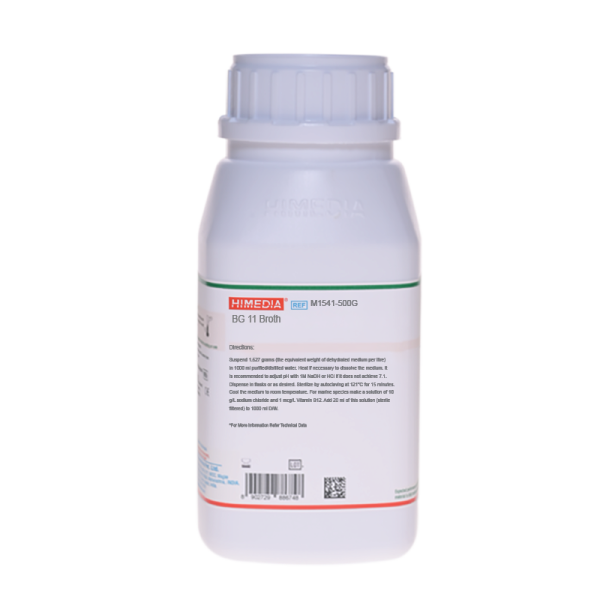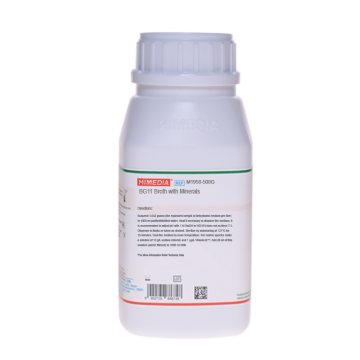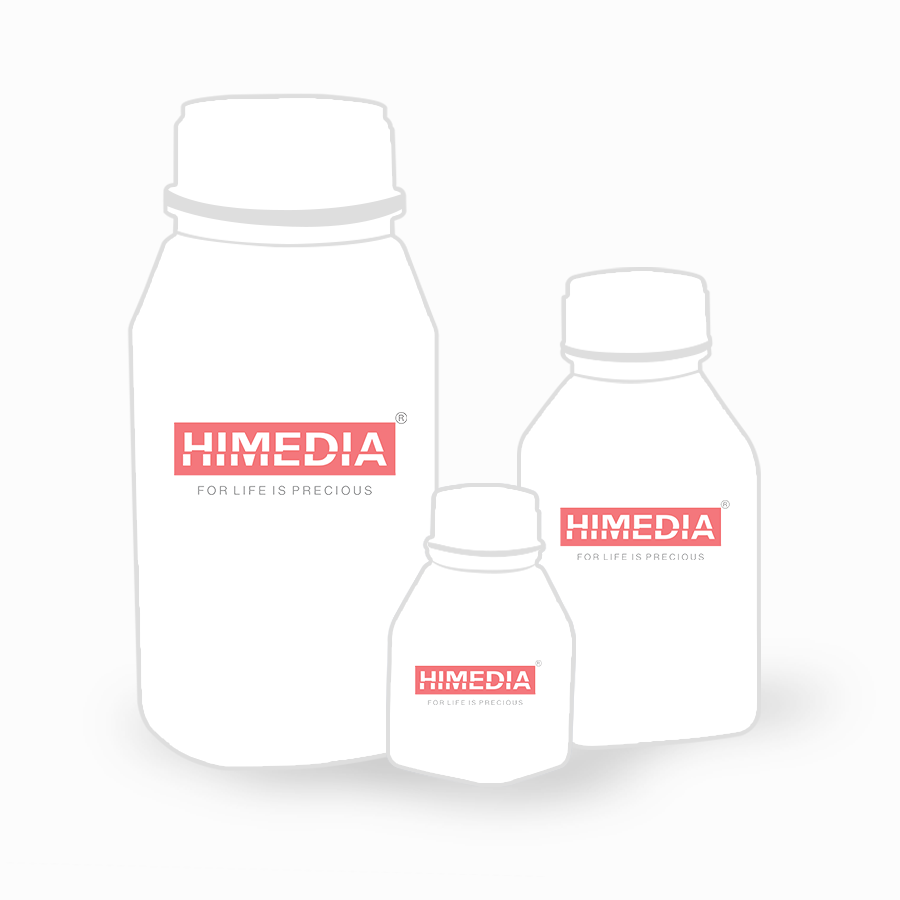 Your enquiry has been submitted
Your enquiry has been submitted
BG 11 Broth
Intended Use
For non-selective isolation, cultivation and pigment production of Pseudomonas species.
Composition
| Ingredients | g / L |
|---|---|
| Proteose peptone | 20.000 |
| Potassium sulphate | 10.000 |
| Magnesium chloride | 1.640 |
| Agar | 15.000 |
Final pH ( at 25°C): 7.3±0.1
**Formula adjusted, standardized to suit performance parameters
Directions
Suspend 46.64 grams in 1000 ml purified/distilled water containing 10 ml of glycerol. Heat to boiling to dissolve the medium completely. Sterilize by autoclaving at 15 lbs pressure (121°C) for 15 minutes. Cool to 45-50°C. Mix well and aseptically pour into sterile Petri plates.
Principle And Interpretation
Pseudomonas aeruginosa is known to produce two types of pigments, pyocyanin and fluorescein which is a characteristic property and aids in isolation of Pseudomonas from clinical material. An additional pigment called as pyorubin was reported by King. Pyocyanin is green while fluorescein is fluorescent yellow and pyorubin is reddish brown. Some strains produce all these pigments while the others produce one or two pigments. P.aeruginosa can be identified on Hugh Leifson Medium (M826). Kings Medium A Base is particularly suited for the production of pyocyanin and pyorubin. Kings Medium A Base is based on the formulation of King et al (1,2). This medium can be used as a general medium for the non-selective isolation and pigment production of Pseudomonas species from foods, cosmetic samples etc. These media contain proteose peptone, which provides carbonaceous and nitrogenous compounds for the growth of bacteria. Glycerol serves as a source of energy and also enhances pigment production. Magnesium chloride, potassium sulphate and magnesium sulphate also enhances pigment production. Pigments and/ or their derivatives produced by Pseudomonas species play a role as siderophores in the iron uptake systems of bacteria, and hence, their production is markedly enhanced under conditions of iron deficiency. For inoculation, use the organisms freshly cultured in Kings Medium A, incubate overnight at 37°C and then at room temperature for 6 days.
Type of specimen
Clinical samples - pus, urine ; Water samples.
Specimen Collection and Handling
For clinical samples follow appropriate techniques for handling specimens as per established guidelines (3,4). For water samples, follow appropriate techniques for sample collection, processing as per guidelines and local standards (5). After use, contaminated materials must be sterilized by autoclaving before discarding.
Warning and Precautions
In Vitro diagnostic use. For professional use only. Read the label before opening the container. The media should be handled by trained personnel only. Wear protective gloves/protective clothing/eye protection/face protection. Follow good microbiological lab practices while handling specimens and culture. Standard precautions as per established guidelines should be followed while handling clinical specimens. Safety guidelines may be referred in individual safety data sheets.
Limitations
- For inoculation, use the organisms freshly cultured in Kings Medium A, incubate overnight at 37°C and then at room temperature for 6 days.
- Individual organisms differ in their growth requirement and may show variable growth patterns on the medium.
Performance and Evaluation
Performance of the medium is expected when used as per the direction on the label within the expiry period when stored at recommended temperature.
Quality Control
Appearance: Cream to yellow homogeneous free flowing powder
Gelling: Firm, comparable with 1.5% Agar gel
Colour and Clarity of prepared medium: Light yellow coloured, clear to slightly opalescent gel forms in Petri plates
Reaction: Reaction of 4.6% w/v aqueous solution (containing 1.0%v/v glycerol) at 25°C. pH : 7.3±0.1
pH: 7.20-7.40
Cultural Response
Cultural characteristics observed after an incubation at 35-37°C for 18-24 hours.
| Organism | Inoculum (CFU) | Growth | Recovery | Pigment production |
|---|---|---|---|---|
| Pseudomonas aeruginosa ATCC 17934 | 50-100 | good-luxuriant | >=70% | blue-green |
| Pseudomonas aeruginosa ATCC 27853 (00025*) | 50-100 | good-luxuriant | >=70% | blue-green |
| Pseudomonas aeruginosa ATCC 9027 (00026*) | 50-100 | good-luxuriant | >=70% | blue-green |
| Burkholderia cepacia ATCC 25609 | 50-100 | good-luxuriant | >=70% | no pigment |
Key : (*) - Corresponding WDCM numbers
Storage and Shelf Life
Store between 10-30°C in a tightly closed container and the prepared medium at 20-30°C. Use before expiry date on the label. On opening, product should be properly stored dry, after tightly capping the bottle in order to prevent lump formation due to the hygroscopic nature of the product. Improper storage of the product may lead to lump formation. Store in dry ventilated area protected from extremes of temperature and sources of ignition. Seal the container tightly after use. Product performance is best if used within stated expiry period.
Disposal
User must ensure safe disposal by autoclaving and/or incineration of used or unusable preparations of this product. Follow established laboratory procedures in disposing of infectious materials and material that comes into contact with clinical sample must be decontaminated and disposed of in accordance with current laboratory techniques (3,4).
Reference
- King E. O., Ward M. K. and Raney D. E., 1954, J. Lab and Clin. Med., 44:301-307.
- Murray P. R., Baron E. J., Jorgensen J. H., Pfaller M.A., Yolken R. H., (Eds.), 8th Ed., 2003, Manual of Clinical Microbiology, ASM, Washington, D.C.
- Isenberg, H.D. Clinical Microbiology Procedures Handbook 2nd Edition.
- Jorgensen, J.H., Pfaller, M.A., Carroll, K.C., Funke, G., Landry, M.L., Richter, S.S and Warnock., D.W. (2015) Manual of Clinical Microbiology, 11th Edition. Vol. 1.
- Lipps WC, Braun-Howland EB, Baxter TE,eds. Standard methods for the Examination of Water and Wastewater, 24th ed. Washington DC:APHA Press; 2023.
| Product Name | BG 11 Broth |
|---|---|
| SKU | M1541 |
| Product Type | Regular |
| Physical Form | Powder |
| Origin | Chemically defined |
| Packaging type | HDPE |
| References | 1.Allen, M.M, Steiner,R.Y .J.Gen.Microbiol. 51 ,203 (1968).2.R.Y. Stanier,R. Kunisawa,M. Mandel, & Cohen-Bazire,G. Bacteriol.Rev. 35: 171-205 (1971).3.ATCC Catalogue of Bacteria & Bacteriophages 18th edition, 1992. |
| Customized Product Available | No |





